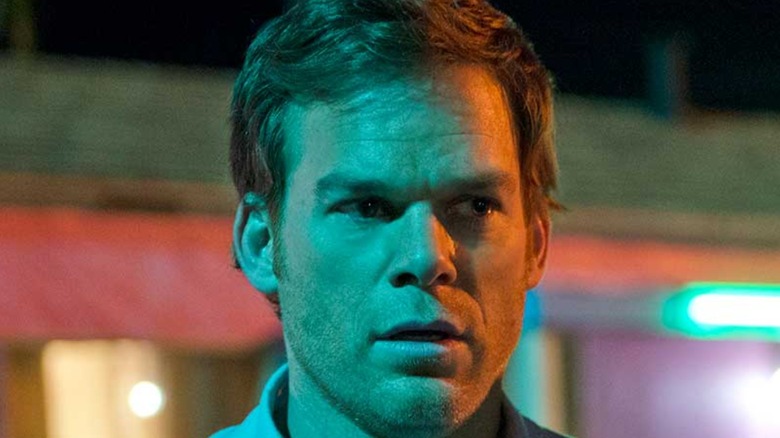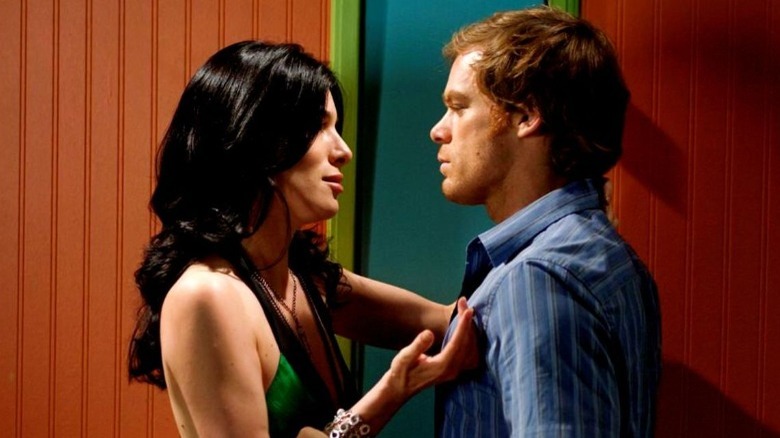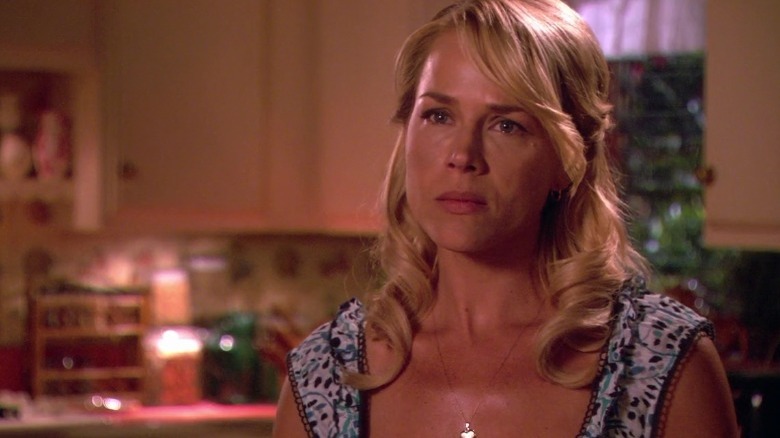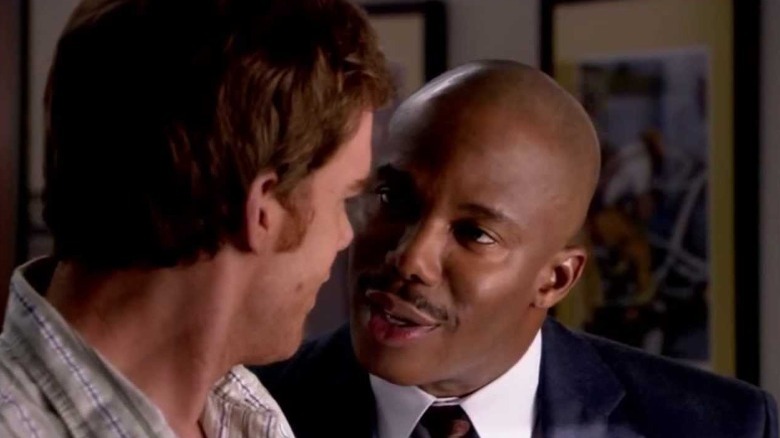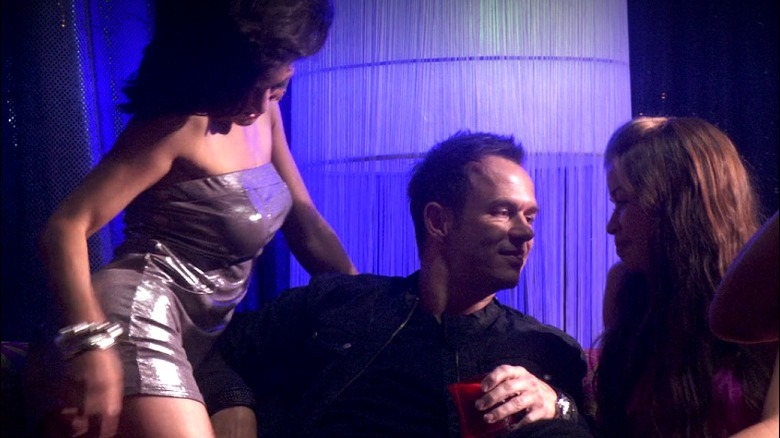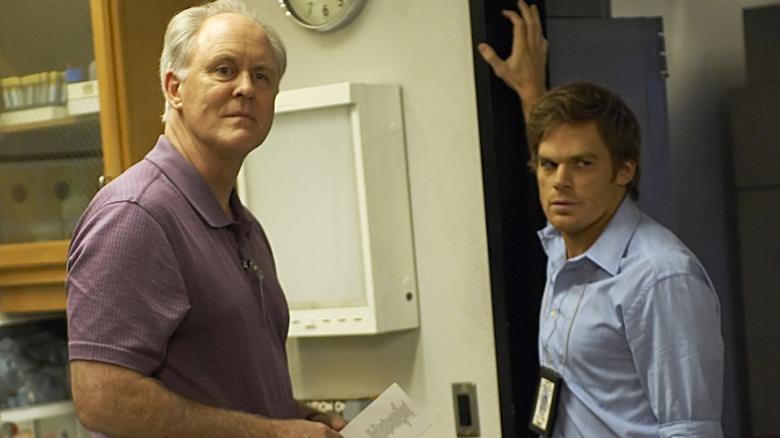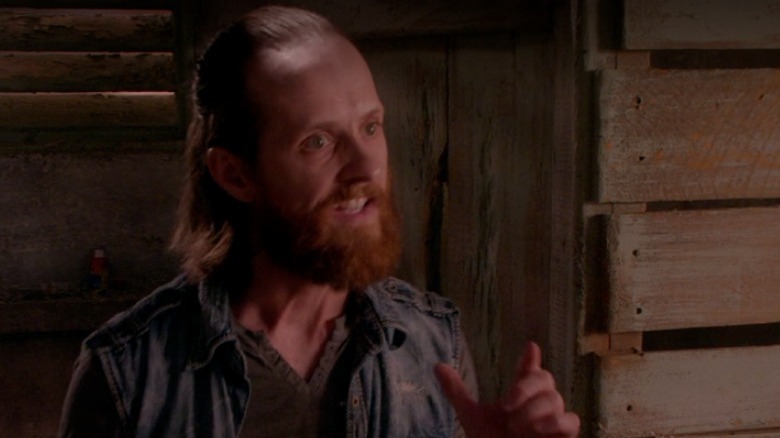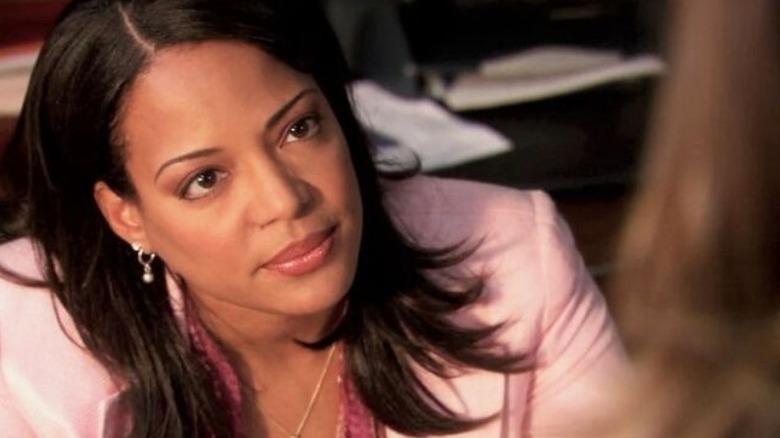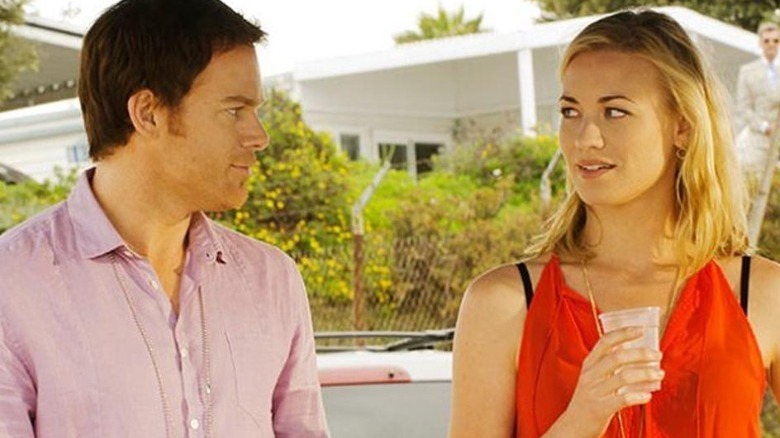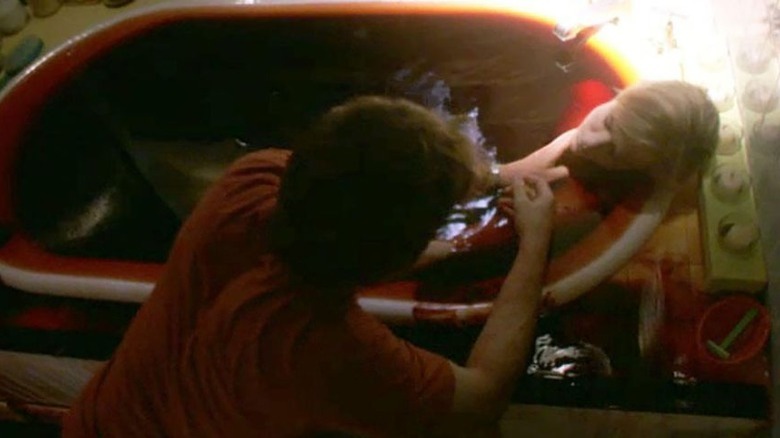Times Dexter Went Too Far
Watching the blood drip down his scalpel with a mixture of anxiousness and satisfaction, Dexter Morgan (Michael C. Hall) is easily one of the more enigmatic characters of his own show despite being the lead character. Even with his constant internal monologue, his sociopathic tendencies make it difficult for audiences to truly read the character despite. Does he ever have genuine remorse? Or is he simply simulating every trait he's ever learned about humanity in an effort to become a "real boy"? Whatever the case may be, Dexter's journey to live by his adopted father's code in an effort to assuage his own desires for bloodshed is just as complex as it would seem. After all, morality becomes something entirely different when murder becomes the norm. Now, the very fabric of conscience is defined by whether the murder was righteous according to the code of Harry Morgan (James Remar) or simply an indulgence on Dexter's part.
When looking at the timeline of Showtime's "Dexter," it's difficult to pinpoint the exact moments when the show's titular character goes "too far." What exactly is "too far" by Dexter standards? Ultimately, Harry's protégé in the art of "just" murder must decide what he cherishes most and make his choices accordingly. Despite his emotionless façade, Dexter clearly has feelings for certain people. Whether he eventually cultivates real desires for human connection over the years or he simply feigns sentimentality is anyone's guess. But typically, his duty to his "loved" ones ultimately determines the level of sin in Dexter's actions.
Let's take a trip down memory lane and look at the moments where Dexter takes things a bit too far during his messy double life.
Befriending Miguel after killing his brother
When leading a life fraught with compulsion and bloodshed, there will always be moments when things go awry. Dexter learned this rather quickly at the start of the 3rd season when tracking a drug dealer by the name of Fred "Freebo" Bowman. Destined to be the next occupant of Dexter's kill table, the operation to nab Freebo is a bust as Dexter must kill an innocent man out of necessity. In self-defense, Dexter kills Oscar Prado — the younger brother of Assistant District Attorney Miguel Prado — while Freebo escapes. Naturally, Dexter manipulates the crime scene in an effort to frame Freebo.
Not one to let his prey abscond for good, Dexter eventually hunts Freebo down and kills him. Meanwhile, Miguel is also on the prowl in an effort to seek revenge for the death of his brother. When Dexter confesses to Miguel that he killed Freebo, Miguel is relieved, and the two begin a friendship on the foundation of murdering criminals. The ugly truth that Dexter is, in fact, Oscar's killer takes the entire affair to another level. It requires him to frame another man for the act while lying through his teeth to his newfound friend over the ordeal. Dexter may not have any remorse, but this hideous secret is one that hopefully doesn't sit well with those of us on the outside looking in.
Getting involved with Lila West
After Dexter is caught arranging for the arrest of Rita's ex-husband, Rita (Julie Benz) incorrectly assumes that Dexter is a drug addict. As a result, Dexter attends Narcotics Anonymous to continue the lie and tamp down suspicions of any other misgivings. While attending the meetings, he meets Lila Tournay, who becomes his sponsor. Quickly, Lila demonstrates a rather manipulative element of her personality as she coaches Dexter to accept himself despite his sins. While she doesn't know of Dexter's "secret passenger," she understands that he harbors a dark secret. Dexter begins to feel comfort in her seemingly nurturing ways and doesn't exactly see the forest for the trees. Eventually, Rita finds out about Dexter's relationship with Lila and breaks up with him. At this point, Dexter fully embraces Lila, and they have sex.
Later, Dexter begins to learn that Lila also has a strange fixation — she is something of a pyromaniac and sets her apartment on fire to manipulate Dexter and seek his sympathy. There were multiple red flags along the way, but Dexter either had blind spots or chose to willingly ignore them. Eventually, Lila stalks Dexter, and he attempts to push her away entirely. Once Lila begins dating Detective Angel Batista (David Zayas), Dexter should have known that Lila wouldn't stop obsessing over him and that trouble was certainly brewing. Eventually, she attempts to blackmail Dexter into getting back together with her, all while Debra (Jennifer Carpenter) learns that her real name is Lila West, and she has a criminal history. Eventually, Lila kills Sergeant Doakes (Erik King), an innocent man, in an effort to protect Dexter. Simply put, Dexter should have put a stop to her dangerous actions long ago.
Copying his marriage proposal from another killer
Dexter's grip on his own humanity is shaky at best. Complicated emotions are difficult to achieve for the seasoned killer as he constantly casts his decisions as a choice between black or white. He has to earn his place in society through contrived relationships and interactions that are often meaningless to him. Such is the life of a remorseless killer. In a bid to blend in, however, he forces himself to date out of a sense of practicality and social conformity. It's easy to suspect an awkward loner of harboring dark secrets, but it becomes much easier to overlook a suspected individual who has an engaging and normal family life.
While Dexter's relationship with Rita begins with the sole purpose of providing him with the camouflage he needs to hide in plain sight from the more inquisitive investigators working each crime scene, it eventually flourishes into some form of legitimacy as Dexter experiences real pain over her untimely death. Unfortunately, however, his sociopathic nature leads to many cringe decisions early in his courtship with Rita. One egregious example is when he plagiarizes his marriage proposal from a killer who romanticized a non-existent relationship in her head (her victim happened to be her obsession). While this killer may have been far too forthright with her delusions of love, Dexter is the exact opposite. Therefore, he lifts her words and uses them as his own when seeking Rita's hand in marriage — once again, for the benefits it affords him.
Framing Doakes as the Bay Harbor Butcher
Sergeant Doakes always had it out for Dexter. He always suspected the titular character of being strange and likely hiding something, and he wasn't wrong. In fact, he learns the truth about Dexter Morgan as he commits to following his activities to see what he's really up to. He soon discovers that Dexter is a killer. When Dexter finds that Doakes has been following him, he overpowers the sergeant and locks him in a cell at a remote cabin where he planned to conduct his bloody business. At this point, Dexter lays it all out on the table and tells the sergeant that he is the Bay Harbor Butcher. Ultimately, Dexter commits to evading law enforcement by framing Doakes as the serial killer.
Dexter then kills one of his targets in the cabin in front of Doakes. After he witnesses the shock of the police sergeant toward his bold crimes, he reflects on his past realizes that Harry actually committed suicide because he couldn't cope with Dexter's actions despite teaching him the code and trying to protect him. The sergeant's shock reflects what Harry must've felt, and Dexter considers doing the noble thing — turning himself in. Unfortunately for Doakes, Dexter has a manipulative and clingy seductress in the form of Lila West, who finds the remote cabin and burns it to the ground with Doakes and Dexter's serial killing evidence inside. The FBI then concludes that Doakes is the Bay Harbor Butcher, allowing Dexter to walk away free as a bird. While a moment of introspection almost leads Dexter to do the right thing, he still originally planned to frame an innocent man for murder. That's low, even by Dexter's standards.
If you or anyone you know is having suicidal thoughts, please call the National Suicide Prevention Lifeline at 1-800-273-TALK (8255).
Killing an innocent man without complete verification of his crimes
Dexter has had his fair share of ups and downs, but he always took pride in following Harry's code to the letter and ensuring that he didn't ever kill an innocent because of his own bloodlust. That all came crashing down in the 4th season during the episode "Slack Tide." In this episode, the Miami PD is hunting for a killer after finding the arm of a model inside the belly of an alligator. This turns Dexter on to Jonathan Farrow, a photographer who takes twisted pictures of female models who all appear tortured or under duress. Initially, Dexter proceeds according to routine while investigating the suspect. However, the stresses of work and life take a toll, and Dexter takes Cody and a few other boys on a boating trip.
Following the trip, Dexter becomes intent on nabbing Farrow before the Miami PD finds the evidence that they need to make the arrest and eventually gets the suspect on his infamous kill table. While the photographer adamantly insists that he never killed anyone and that his photographs are merely art, Dexter pulls the trigger anyhow and hacks the man to death with a cleaver. Later, he sees Detective Batista taking Farrow's assistant into custody and charging him with the murder of the women. Unbeknownst to Dexter, uncovered surveillance footage actually incriminated Farrow's assistant, burdening Dexter with the harsh reality that he killed an innocent man. While Dexter often lacks remorse, his behavior demonstrates guilt over the idea that he betrayed Harry. To the rest of us, Dexter's negligence led to the death of an innocent man.
Imitating the Trinity Killer
The 4th season of Dexter is considered the best in the entire series, and for good reason — John Lithgow plays one of the most captivating antagonists of the series in the form of the deadly Trinity Killer. The killer, Arthur Mitchell, is a tortured soul who admittedly went through an equally traumatic experience as Dexter did as a young boy where he witnessed the death of his sister and the suicide of his mother. He also grappled with his compulsory need to kill his abusive father at the youthful age of 10. This moment ultimately completes the trinity killing template that Arthur use annually with three innocent victims.
The Trinity Killer's identity as Arthur Mitchell surprises Dexter. He learns that Arthur is a family man who contributes service regularly to his local church and leads a charitable organization known as "Four Walls One Heart," which he uses to construct homes for the less fortunate. Ultimately, Dexter quizzically wonders how Arthur can maintain the balance of leading two totally separate lives. Instead of killing Trinity, Dexter decides to don the fake alias of Kyle Butler and infiltrate Arthur's congregation in an effort to educate himself on how to better lead a normal life outside of his killing rituals.
Quickly, however, Dexter learns that Arthur is a rather abusive father who behaves erratically. Maintaining a healthy balance isn't possible, and Dexter then plots to kill him. Of course, the Miami PD is closing in on the killer, putting Dexter against the clock. If Dexter had killed the Trinity Killer when he first learned of his crimes, the deaths and despair that followed wouldn't have occurred.
Beginning his relationship with Rita by killing on their first date
Following the death of Rita, Dexter realizes a bit too late how much he truly loves her. In a flashback sequence, we see the couple's first date, which occurred at some point before the events in the 1st season. Apparently, Dexter's sister Debra arranged the occasion, and while out for an evening of romance, Dexter takes the opportunity to continue his dirty work as a serial killing obsessive. After all, he hardly knows Rita all that well, and making attachments proves to be fairly difficult for him — he simply goes going through the motions in an effort to appear normal. If only he knew that it'd lead to the best relationship he could've ever hoped to have, as well as the birth of his son.
In the flashback, Dexter excuses himself to follow a gentleman he is targeting. Promptly, he plunges the needle into his target and manages to place the unconscious man in his car without being seen. Of course, the event was entirely premeditated, and Dexter selected the restaurant for strategic purposes. Rita, none the wiser, has no clue what Dexter is up to and only hopes to get to know him personally. Painfully, Dexter cuts the date short with a feigned excuse. While a beloved character in the eyes of many, it's obvious that Dexter didn't deserve Rita. Not only that, but this retrospective replay in his mind might have sparked a tinge of regret and pushed him to come to the same conclusion.
Killing an innocent man out of anger
Alright, the word "innocent" might be a tad far-flung for this character. But as far as we know on screen, he hadn't committed any crimes worthy of Dexter's kill table. In the debut episode for Season 5, Dexter prepares for the funeral of Rita. After coming to grips with his own grief and regret, he enters a convenience store and crosses paths with a charming individual who is pounding the bell at the counter for a restroom key and threatening to defecate on the floor.
After reaching behind the counter and finding the bathroom key himself, he brushes past Dexter, locking eyes with him and making an untoward comment. Regrettably for this hot-headed fool, he spouted off at the wrong place and time — Dexter's sense of self-control is at an all-time low as he struggles to pick up the pieces of his shattered life. The killer follows the man to the bathroom and explains to him that the week hasn't been kind, thanks to the death of his wife. The man makes another unsavory remark about Dexter's deceased wife and then quickly receives several blows to the head with the blunt end of a boat anchor. While the foul-mouthed vagrant was possibly deserving of many things, insults and ravings aren't exactly worthy of a death sentence. It's definitely not Dexter's finest moment, and it marks the first time ever that he kills an unvetted person solely on impulse and emotion.
Planning to kill Laguerta
In the 7th season of the show, the walls are closing in on Dexter Morgan, and Captain Laguerta (Luna Lauren Vélez) is leading the charge in a persistent effort to exonerate her former and late partner, Sergeant Doakes, of the Bay Harbor Butcher name. Laguerta makes it frighteningly clear that she intends to "nail Dexter to the wall" after her first attempt at arresting him goes belly up, thanks to some careful planning on Dexter's part. Furthermore, Laguerta is in the process of obtaining a warrant for the GPS data on both Deb's and Dexter's phones the day Travis Marshall was killed at the end of the 6th season. The brother and sister duo are entirely in her crosshairs.
Seeing that she simply won't quit, Dexter plans the unthinkable — a premeditated murder that defies the code entirely. Dexter has violated the code in the past, but the plot to kill Laguerta feels especially dirty given the lengthy professional and sometimes personal relationship the two shared over the years. Dexter lures Laguerta to an empty shipping container at the docks, where he subdues her and prepares to stage a faux event that suggests Hector Estrada and Laguerta killed each other. Deb joins the party, however, and nearly crumbles at the revelation that Dexter is a killer. As Laguerta attempts to convince Deb to kill Dexter, Deb kills Laguerta instead.
In an effort to protect himself and his sister, Dexter ultimately breaks his father's code with the plot to kill an innocent police captain while simultaneously ruining Debra's life. In the following season, the guilt nearly eats her alive.
Having sex with Hannah on his kill table
In the 7th season of the show, the most significant volatile variable to enter Dexter's life is Hannah McKay (Yvonne Strahovski). Quickly, the two share a connection that is only heightened after further revelations throughout the season. Her past is of particular interest to Dexter, as she joined a controlling boyfriend on a murder spree. If he were to believe Hannah's story, she was forced into complicity. However, Dexter suspects that Hannah was just as involved and thrilled about the killing spree as her murderous beau. After carefully investigating Hannah, the evidence stacks up, and Dexter prepares his kill table. He follows the typical routine of rendering her unconscious and binding her to the table.
However, after Dexter tells her that murders like the one he is about to perform are the very thing that fuels his existence, she simply replies, "Do what you gotta do." Something about her unwavering commitment to her own identity in the face of death and recognizing Dexter as a vicious killer resonates with Dexter, and he cuts her free. The two then proceed to have sex on the kill table. Perhaps this moment caused viewers to remember Dexter's manipulation at the hands of Lila earlier in the series. Or maybe, Hannah just proved to be unlikeable, despite her magnetism toward Dexter and her eventual unwavering commitment to Harrison. Regardless, seeing Dexter succumb to Hannah's apparent charms isn't exactly what audiences expected. And for a person whose soul is rather empty, he should at least keep one thing in his life sacred — the kill table.
Causing Rita's death
While Dexter may have ended the life of Arthur Mitchell, the Trinity Killer had the final word in their climactic clash. Ultimately, Rita was an unfortunate casualty in the deadly game of cat and mouse that Dexter and Arthur played. However, the ugly truth of the matter is that Rita's death is on Dexter's hands for tampering with forces he couldn't comprehend. Even he didn't know what Trinity was capable of until he was fully immersed in his fake persona of Kyle Butler and witnessed Trinity's social and familial interactions firsthand.
Within the realm of most sensible options that would've prevented Rita from becoming a target, the most obvious choice would've been for Dexter to simply never get himself involved with the Trinity Killer in the first place. But of course, that would've made for an ultra-boring show, and we all know that Dexter's compulsory killing habits can't simply leave things well enough alone. The next best option would've been to never give in to his infatuation with the Trinity Killer and his methods for leading a double life. If Dexter didn't treat Arthur like some sort of twisted mentor in the art of serial-killing-while-appearing-normal, maybe he could've performed the killing plunge on Arthur a bit earlier — before the two even get entangled in the inevitable drama that rears its ugly head. Regardless of the perspective, Dexter's drive to kill and his admiration for Trinity were ultimately the causes of Rita's death at Trinity's hands. It was a difficult lesson that Dexter had a hard time learning. Old habits die hard.
